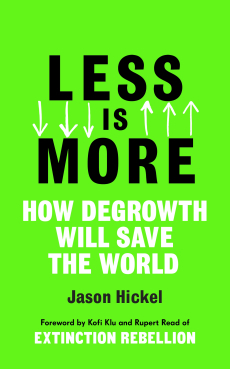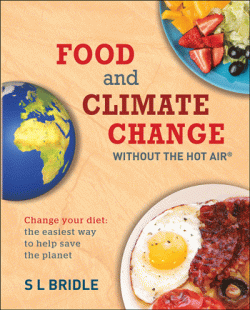Jeremy Williams's Blog, page 108
September 14, 2020
Book review: Less is More, by Jason Hickel
 Less is More is a book with an ambitious subtitle: How Degrowth Will Save the World. That’s a big claim, but this is by Jason Hickel, one of the most thoughtful proponents of postgrowth thinking, and author of The Divide, one of my favourite books of 2018. He has a better chance than most at backing that up.
Less is More is a book with an ambitious subtitle: How Degrowth Will Save the World. That’s a big claim, but this is by Jason Hickel, one of the most thoughtful proponents of postgrowth thinking, and author of The Divide, one of my favourite books of 2018. He has a better chance than most at backing that up.
Degrowth is often used as a confrontational word, but here it is used more hopefully. There is a nuanced view of what the world needs less of and what it needs more of, creating an inspiring...
September 12, 2020
What we learned this week
Media outlets consistently fail to incorporate the climate into stories that aren’t specifically about climate change. California’s current weather is a case in point, argues Emily Atkin in the Heated newsletter.
SEED Madagascar are running a great fundraising project for Coronavirus response in the country. Buy a mask, and it pays for 5 masks to be made and distributed in Madagascar. I know you have a mask already, but it doesn’t have lemurs on it, does it? Didn’t think so.
September 11, 2020
Tenet, climate change and intergenerational justice
Caution – this article contains spoilers. If you haven’t seen Tenet yet, maybe come back later.
School restarted last week, so my wife and I hightailed it to the cinema to see Christopher Nolan’s new film Tenet. Other commentators can tell you about the various merits of the film, its action sequences and its time twisting plot. I want to talk about it in relation to climate change. Obviously.
Tenet deals with a World War III scenario where the future is at war with the past. The future is medd...
September 10, 2020
The UK’s Climate Assembly delivers its report
Citizen’s Assemblies are a political innovation that I’ve had my eye on. They aim to draw together a representative group of citizens from across the country, give them the best information available on a tricky question, and let them come up with solutions.
There are different ways to set up a citizen’s assembly. They can be advisory, or governments can delegate decision making to them. Either way, the idea is that an assembly will reflect the informed opinion of the citizenry. It can get past ...
September 9, 2020
Poland demonstrates the changing economics of renewable energy
There’s a lot of bad news about the climate out there, but one story that’s gratifying to follow is the economics of renewable energy. Because renewable energy has no fuel, it is essentially free at the point of use. There is no charge for the wind or the sun. Once they are are installed, renewable energy can always beat fossil fuels on price, a process I’ve described in more detail here.
The expensive bit of renewable energy is the installation, and that’s partly been a problem of scale. As the...
September 8, 2020
Lesotho’s greener mobile network
The mobile phone sector has been famously dynamic in Africa, with a history of innovation that includes mobile banking, citizen reporting, and some pioneering mobile infrastructure in Lesotho.
Lesotho is a small and mountainous country, beloved of geography students for being an ‘enclave nation’ – it is bordered on all sides by South Africa. In 2012, the mobile phone company Vodacom began to install green base stations – off-grid mobile towers that were powered by solar and wind energy, with bat...
September 7, 2020
Food and Climate change – Without the Hot Air
 Sustainable Energy Without the Hot Air was published by David MacKay in 2009, and it remains a go-to resource for level headed facts about energy, not least because it’s available in its entirety online. The publisher, UIT Cambridge, have since produced a series of ‘without the hot air’ books in a similar vein, including books on materials and on urban transport that I’ve reviewed here before.
Sustainable Energy Without the Hot Air was published by David MacKay in 2009, and it remains a go-to resource for level headed facts about energy, not least because it’s available in its entirety online. The publisher, UIT Cambridge, have since produced a series of ‘without the hot air’ books in a similar vein, including books on materials and on urban transport that I’ve reviewed here before.
This latest in the series takes the same approach of crunching the numbers and presenting them in imagi...
September 5, 2020
What we learned this week
SSE is the first British power company to announce that it will create a ‘just transition’ strategy as it shifts towards net zero. Details to follow and I’ll report on it when they publish it. Good example of shareholder activism too, as this follows a written question to their AGM.
This is heartbreaking and highly predictable: big oil companies are lobbying US trade deal negotiators to force African countries to reverse their bans on plastic.
The National Farmers Union has warned that Britain’s...
September 4, 2020
The bikes first roundabout makes its UK debut
This week I’m combining the transport innovation and building of the week features to write about this: the Fendon Road roundabout in Cambridge. It’s the first one in the country to use a Dutch design, introduced in the Netherlands from 2010, which puts active transport users first.
Drivers slow down and give way to pedestrians, then to cyclists and then to other cars, both on entering and exiting the roundabout. It’s best understood with an aerial shot, which also shows off the flow through tho...
September 2, 2020
How Brewdog are taking climate responsibility
Brewdog are one of Britain’s leading craft brewers, based in Edinburgh and with a growing reputation. They are known for doing business differently, including using community funding initiatives and paying a living wage. Perhaps their boldest idea is to take an open source approach and publish all the recipes for their beers so that home brewers can try them out for themselves.
This year Brewdog have added a raft of new sustainability measures alongside their existing community work. They announ...



